THE
BIG BOYS WALK IN
The key players in the Indian retail
space and their future plans. |
| PLAYER |
PLANS |
| TATAS |
After stabilising operations of their Westside
chain of lifestyle stores, the Tatas are launching a chain of
hypermarkets called Star India Bazaar. Each hypermarket will
be around 50,000 sq. ft., and the first will open in Ahmedabad
in the next few months. |
| AMBANIS |
Into telecom and broadband-driven retailing through
their WebWorlds, 200 of them. Petroleum retail outlets-for which
the Ambanis have licences for 5,849 outlets-could also have
food and groceries stores, WebWorlds and Java Green coffee shops. |
| ITC |
Embraced the rural retail model and plans to put
up stores called Choupal Sagars, each catering to 100 villages.
The first Choupal Sagar in Sehore (MP) is already operational.
ITC plans to have 1,000 of such Choupal Sagars, with 50 of them
scheduled to be set up in the first year itself at an investment
of Rs 150 crore. |
| HLL |
In the retail space with its Lakme Beauty Salons
and Ayush Therapy centres. Currently has 65 Lakme salons and
12 Ayush Therapy centres. Plans to expand to 100 Lakme salons
and 30 Ayush Therapy centres in one year. |
| HERO GROUP |
Creating a chain of 7-Eleven type of convenience
retail stores, for which the Munjals will tie up with companies
and banks. From the current level of 700-odd stores, the group
plans to have 10,000 outlets spread across the country over
the next three years. |
| BHARTI |
Foraying into broadband retailing, with scope
to offer video-conferencing, high-speed internet, virtual gaming....
The works. |
|
WADIAS SINGHANIAS GODREJ
|
In various stages of evaluation of different models.
Wadias will probably set up a chain of lifestyle stores, Raymond
is evaluating various models including hypermarkets, and Godrej
has embarked on an environment-scanning process. |
| RPG GROUP |
One of the few conglomerates to venture relatively
early into retail, the group is aggressively expanding its beauty
centres (Health & Glow), music stores (Music World), and hypermarkets
Food World and Giant (which could be renamed Spencer's). The
largest organised retailer has envisaged an investment of Rs
140 crore over the next three years. |
| AJAY PIRAMAL |
Another early entrant, Piramal is expanding his
lifestyle stores (with super-markets), Piramyd, from three to
16 in three years, at a cost of Rs 320 crore |
Last
fortnight, on a humid September afternoon, a motley bunch of organised
retailers got together at the Taj Apollo Bunder in South Mumbai
to flag off the Retail Association of India, a body that will ostensibly
safeguard the interests of the players in one of India's newer sunrise
sectors. The head honchos present included virtually all the poster
boys of Indian retail as you know it today: Noel Tata of Trent,
Kishore Biyani of Pantaloon Retail, B.S. Nagesh of Shoppers' Stop,
Vinay Nadkarni of Globus Stores and B.A. Srinivasa of Vivek Ltd.
An impressive line-up to be sure, but Biyani,
Nagesh and company will be well aware that some of the biggest names
in corporate India are preparing to gatecrash the existing cozy
club of Indian retail. The Tatas, Goenkas (with RPG retail) and
Piramals (Crossroads and Piramyd) may have been a part of the first
wave, but seven to eight years after organised retail was spotted
as a business opportunity, a whole host of mega Indian corporations
are blueprinting their entries into this sector even as the existing
majors, after achieving critical mass and maturity, draw up huge
expansion plans. The models being pursued are varied, ranging from
rural to foods and groceries to petrol pumps to lifestyle, but if
the Godrejs, Wadias, Ambanis, Mittals of Bharti, Munjals of the
Hero group, the Singhanias of Raymond and ITC have been seduced
by retail, it's simply because of the awesome opportunity up there
for grabs. According to consultants KSA Technopak, the organised
slice of the pie is expected to balloon to a mind-numbing Rs 1,80,000-2,00,000
crore by 2010-a ten-fold increase over the next six years! By then,
organised retail, currently just 2 per cent (or Rs 22,500 crore)
of total retail, will move up to 10-12 per cent.
Those projections are being translated into
frenetic activity on the ground. KSA estimates that in three to
four years, over 300 malls, over 50 million sq. ft. of retail space,
will spring up. And over 600 malls over 100 million sq. ft. will
dot the Indian landscape by 2010. Unitech Ltd., a Delhi-based construction
company, is developing seven malls and four regional town centres.
"Our focus is on malls in Delhi, Gurgaon, Noida, Faridabad,
Bangalore and Kolkata," says Sanjay Chandra, Director, Unitech
Ltd. Amongst these is a 15-lakh sq. ft. shopping mall in Noida.
According to Unitech, this would be the largest mall in the country,
with another five lakh sq. ft. of parking space spread over two
basement levels. The project would be completed in two phases by
2006 at a cost of around Rs 1,000 crore. Similarly, in Bangalore,
Mantri Developers are coming up with an 18 lakh sq. ft.-mall in
Koramangala.
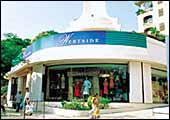 |
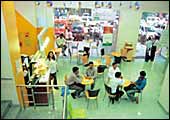 |
| Tata Westside |
Reliance WebWorld |
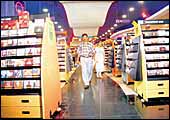 |
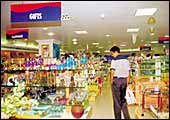 |
| RPG Music World |
Lifestyle |
The existing players for their part have little
problems (and little choice too) in rolling out the welcome wagon
for mega-India Inc.-"There's enough of a market for all,"
suggests Nagesh of Shoppers' Stop-and at least one of them predicts
that most big businesses will take the plunge into hypermarkets.
So if an Ambani or a Godrej decides to sell foodstuff and groceries,
there's a simple reason for that: 52 per cent of the total retail
pie of Rs 8,57,000 crore is accounted for by these items. Another
trigger for the entry of the Godrejs and the Wadias is that both
these Mumbai-based business groups are sitting on acres and acres
of real estate. Meanwhile, the Ambanis and the Sahara Group are
the largest acquirers of land today. The best way of jacking up
the value of that land? Elementary, open a mall there. For instance,
if Godrej Properties and Investments Ltd. is building a residential
complex in Vikhroli (a Mumbai suburb roughly 40 km from the city),
the best way to rack up the real-estate rates in that area is by
opening a large mall, complete with a hypermarket. And remember,
you don't need to be particularly well-heeled to visit those markets-(almost)
everybody spends on food and groceries, right?
CALL OF THE MALL
Malls are driving real estate prices.
|
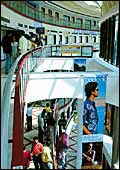 |
| Mall swarm: 600 malls are expected
in India by 2010 |
Opening a mall on a piece of land,
complete with a multiplex and a hypermarket, is the best way
to push up the real estate rates of a locality. Unlike in the
past, where high interest rates and low degree of consumerism
had made the mall business unprofitable, today malls offer the
highest return on investment (RoI) in the real estate business.
According to Anuj Puri, Managing Director, Chesterton Meghraj,
the RoI for malls is 12 per cent per annum. For corporate buildings
and residential complexes, on the other hand, the RoI is 10
per cent and 5-6 per cent, respectively.
B.S. Nagesh, Managing Director and CEO, Shoppers' Stop,
says it's this high RoI that is driving new players into the
retail business. If a mall is well run, the capital appreciation
is the highest in this sector. What's more, 40-50 per cent
of the retail space in a mall gets leased out even before
the developer has begun to dig the ground. For instance, according
to a Chesterton Meghraj report, in 2006, 26 new malls will
come up in metros, adding 7.1 million sq. ft. of retail space.
But as of today, over 32 per cent of that space has already
been leased out. By the time the superstructure of a mall
is ready, 70 per cent of the retail space is invariably leased
out. "Malls, in that sense, is a low risk business,"
adds Puri. The moment a mall comes up in an area, residential
property surrounding the mall gets a premium of Rs 50 to 60
per sq. ft. Now you know where to buy your next home.
|
MALL MANIA
The lure of the mall. |
» Over
the next 3-4 years, 300 malls* will come up across the country,
translating into over 50 million sq. ft. of new retail space
» By 2010,
over 600 malls are expected to come up across the country. That
would be 100 million sq. ft. of new high-quality retail space
(* Malls with space equivalent to 1,00,000 sq. ft. or more)
Source: KSA Technopak |
Of course, retailers can't live on bread alone.
Mukesh Ambani, Chairman of Reliance, is talking about "revolutionalising
petroleum retailing." Reliance Petroleum will be rolling out
5,849 petroleum retails over the next three to five years. The market
buzz is that some of Reliance's fuel pumps would have a supermarket
that sells food and groceries, a Reliance Infocomm WebWorld, a Java
Green coffee shop and perhaps even a Vimal showroom offering you
suits, shirtings, dress material, pillows, cushions and bedcovers.
Reliance Infocomm has already got into broadband-driven
retailing. Reliance WebWorlds offer video conferencing facilities,
online gaming and cyber café facilities. You could get your
business cards and greeting cards printed, and computer classes
for kids and their mothers are also held. According to Sarup Chowdhary,
CEO of Reliance WebWorld, out of the existing 240 WebWorlds, 200
are into the broadband mode. Soon, you could also burn CDs with
your favourite music at these WebWorlds. As compared to Reliance
Infocomm Mobile (rim) sales and service, the broadband services
should generate three times as much revenues, feels Chowdhary. All
these broadband initiatives are linked to Reliance Infocomm's larger
gameplan of offering broadband to homes and offices. Besides this,
Reliance also hopes to set up 2,000 Java Green Coffee stores across
the country.
Even the Bharti group has plans to get into
broadband-driven retailing. After integrating its telecom services
under the Airtel brand, the group has some interesting broadband-related
retailing plans. These will be offered through 600 Airtel Connects
across the country.
 The
Rs 404-crore Shoppers' Stop is setting up 11 new stores in three
years. Its promoters are also getting into the hypermarket space The
Rs 404-crore Shoppers' Stop is setting up 11 new stores in three
years. Its promoters are also getting into the hypermarket space
B.S. Nagesh,
MD and CEO/Shoppers' Stop |
A few of the new entrants like the Godrejs and
Wadias are tightlipped about their plans. According to a Godrej
official, the group is tracking developments in retail since this
is a fast growing sector of the economy. "As part of our environment
scanning process, we are evaluating the retail sector," adds
this official. According to market sources, the Godrej group has
evinced keen interest in the hypermarket business. Similarly, according
to market sources, the Wadias are also evaluating a retail format.
The retail venture, it is learnt, would be headed by Ness Wadia
(the Wadias did not respond to a BT questionnaire).
The Singhanias of Raymond are already present
in retail with the Raymond Shop concept, which has 310 outlets nationally
and internationally. Another 30 stores are in the offing and 22
exclusive stores for brands like Park Avenue and Parx will be coming
up shortly. Besides this, the premium Raymond brand, Manzoni, will
have 50 new outlets. Raymond also has a designerwear store-Be-which
has 15 outlets in 10 cities. Over the next year, Be will have six
to eight more outlets. Besides these initiatives, Raymond is open
to entering any other formats of retailing. "If we see enough
opportunity in getting into other formats of retailing, we would
get into it," says Pradeep Bhandari, Deputy Group President,
Raymond Ltd.
 The
Hero Group plans to have 10,000 7-Eleven type convenience retail
stores over the next three years The
Hero Group plans to have 10,000 7-Eleven type convenience retail
stores over the next three years
Rahul Munjal,
CEO/ Easy Bill |
 ITC
plans to set up 50 Choupal Sagars spread across rural MP and
UP over the next one year ITC
plans to set up 50 Choupal Sagars spread across rural MP and
UP over the next one year
Yogi Deveshwar,
Chairman/ITC |
ITC, which had restricted itself to lifestyle
retailing through its Wills Lifestyle stores, recently made a foray
into rural retailing through its first Choupal Sagar store at Sehore
in mp. According to Y.C. Deveshwar, while ITC's e-choupal initiative
(whereby an internet kiosk is installed in a village to deliver
information on agriculture to farmers) is aimed at increasing the
earning of the farmers, Choupal Sagar is a one-stop physical infrastructure
for farmers to sell their agricultural produce to ITC. Besides,
it houses a soil testing laboratory, a farmer training centre, a
medical consultation and diagnostic facility, a restaurant, a store
selling quality products for both farm and household consumption
sourced from manufacturers at competitive prices, and banking and
insurance services. Deveshwar's dream is to have 1,000 Choupal Sagars
and 25,000 e-choupals serving one lakh villages. According to S.
Sivakumar, head of Agri Business, ITC, the company plans to set
up about 50 such stores spread across rural MP and UP over the next
one year.
Meanwhile, as the industry attains critical
mass and consumers become more willing to take a shine to organised
retail, the existing players are steaming ahead with ambitious expansion
plans. K. Raheja, promoter of Shoppers' Stop (whose initial public
offering will hit the markets in the coming weeks), is getting into
the hypermarkets space via a new company. The Rs 404-crore Shoppers'
Stop will set up 11 new stores in three years. Speciality store
Globus will add five new outlets to the existing seven in one year
flat. And Lifestyle International (p) Ltd., which has seven stores
across the country, will be setting up 14 new stores over the next
three years at a cost of Rs 140 crore.
 Raymond
is already in retail with Raymond Shop and Be, and is open to
other retail formats like hypermarkets Raymond
is already in retail with Raymond Shop and Be, and is open to
other retail formats like hypermarkets
Gautam Singhania,
Chairman/Raymond |
 Market
sources say that Godrej is interested in the hypermarket business,
but the company is tightlipped Market
sources say that Godrej is interested in the hypermarket business,
but the company is tightlipped
Adi Godrej,
Chairman/
Godrej Group |
At least for the next few years, the existing
players needn't fear too much the muscle of the new big boys. As
Arvind Singhal, Chairman, KSA Technopak, says, "The opportunity
is huge. And I wish more corporates would look at retailing in a
big way." Singhal puts the opportunity in foods and groceries
in perspective: That segment, according to him, is worth upwards
of Rs 6,00,000 crore per annum. "The biggest player in food
retailing-Foodworld-is no bigger than Rs 400 crore," he says.
Similarly, textiles is a Rs 85,000-crore business (including clothing,
home furnishing, lingerie, sleepware, etc.) and the largest supplier-Madura
garments-is only around Rs 400 crore. Even Shoppers' Stop, which
gets about 60 to 70 per cent of its turnover from textiles, is a
Rs 404-crore company. In comparison, Japanese retail firm Aeon is
a $20-billion (Rs 92,000-crore) firm. "In India, the largest
retailer-RPG Group-has a retail business of only $118 million (Rs
542.8 crore)," adds Singhal.
 Reliance
Petroleum has plans to roll out 5,849 petroleum retails over
the next three to five years Reliance
Petroleum has plans to roll out 5,849 petroleum retails over
the next three to five years
Mukesh Ambani,
Chairman/ Reliance Group |
 The
Tatas are launching a chain of hypermarkets called Star India
Bazaar, starting with Ahmedabad The
Tatas are launching a chain of hypermarkets called Star India
Bazaar, starting with Ahmedabad
Noel Tata,
Managing Director/Trent |
Consolidation perhaps will be inevitable but
as Anuj Puri, Managing Director of real estate consultancy Chesterton
Meghraj, points out: "It may not happen very soon." Singhal
is of the view that once FDI in retail is allowed, several multinational
retail chains will make a beeline for India and could merge with
(if not acquire) the existing large players. According to Puri,
so long as demand far exceeds supply, M&As in retail won't happen.
"It will take India some time to reach the level that America
has reached today-a market that is consolidating on the retail front,"
adds Puri. According to him, M&As in retail are at least seven
to 10 years away. Till then, the players in India's retail sector
can step on the gas and grow their respective businesses. Don't
forget that us retailer Wal-Mart is the largest company in the world,
according to Fortune 500. Wal-Mart's Indian counterparts have just
begun that quest for size and scale. They have a long road ahead,
paved with countless opportunities and limitless potential. (See
Hot Retail Formats on page 66).
-additional
reporting by Arnab Mitra, Sahad P.V., Priyanka Sangani, Amanpreet
Singh and Nitya Varadarajan
| Hot Retail Formats |
I. FOOD AND GROCERY
Opportunity: Rs 6,00,000 crore
Big players: RPG, Pantaloon
Likely big players of tomorrow: Reliance through its
malls at fuel pumps, Tatas, Godrejs
Over 52 per cent of the total consumer spending in India
is in food and groceries. However, organised retail of food
and groceries is estimated at less than Rs 2,000 crore. The
gestation period can be as short as nine months. According
to KSA Technopak, a start-up investment of Rs 50-60 crore
is needed for a regional chain and over Rs 250 crore for a
national chain. Breakeven can happen within 5-7 years.
II. LIFESTYLE RETAILING
Opportunity: Rs 150,000 crore
Big players: Shoppers' Stop, Pantaloon, Piramyd, Westside,
Lifestyle
Likely big players of tomorrow: Raymond/Singhanias,Wadias
Clothing and textile retailing accounts for about 7 per
cent of the total private consumption of Indian consumers,
of which branded products account for around 20 per cent.
This, along with fashion accessories like watches, perfumes,
jewellery and cosmetics, makes lifestyle retailing a fairly
lucrative business. The name of the game, however, is to get
the customer hooked to you through memberships and loyalty
programmes. Just the way Shoppers' Stop, Lifestyle and Westside
are doing it.
III. CONSUMER DURABLES
Opportunity: Rs 50,000 crore
Big players: Vivek Ltd., Vijay Sales
There are no national players in this business as of today.
And some players, the like Viveks in the south, want to go
national only after 2007, when it would have 100 stores in
the three states of Tamil Nadu, Karnataka and Andhra Pradesh.
The scope for such retailing is tremendous. KSA for instance
estimates the market for new mobile handsets at around 26
million a year-a 10,000 crore-odd industry. Besides, categories
like air-conditioners and microwaves are growing at over 15
per cent per annum. According to B.A. Srinivasa, Director,
Vivek Ltd., the return on investment in his business is 25
per cent per annum.
IV. RURAL RETAIL
Opportunity: Rs 3,00,000 crore
Big players: ITC
Likely big players of tomorrow: ITC, M&M, DCM Shriram
ITC recently open a rural mall-'Choupal Sagar'-near Sehore,
Madhya Pradesh. Choupal Sagar offers multiple services under
one roof at a tractor-able distance from the villager's house.
It houses a soil testing laboratory, a farmer training centre,
medical consultation and diagnostic facilities, a restaurant,
a store selling quality products for both farm and household
consumption and banking and insurance services. According
to Y.C. Deveshwar, Chairman, ITC, 87 per cent of the villages
in the country have population lower than 2000, and low per
capita income coupled with poor connectivity makes the economic
spending power of rural India extremely poor. Each Choupal
Sagar therefore caters to over a 100 villages. ITC's dream
is to open 1,000 Choupal Sagars, and around 50 of them will
be coming up in the next one year in Madhya Pradesh and Uttar
Pradesh.
V. BROADBAND-DRIVEN RETAILING
Opportunity: Not Available
Big players: Reliance Infocomm
Likely big players of tomorrow: Reliance, Bharti
From offering video-conferencing to high-speed internet
for gaming to computer classes, a broadband retail store offers
a lot. Around 140 Reliance WebWorlds are already doing much
of that. And with Reliance offering broadband for homes and
offices very soon, WebWorlds can also double up as sales and
service points for these services.
VI. FUEL-PUMP DRIVEN RETAILING
Opportunity: Rs 10,000 crore*
Big players: Indian Oil, BP, Hindustan Petroleum
Likely big players of tomorrow: Reliance, Indian Oil,
Bharat Petroleum, Hindustan Petroleum
The Reliance group promises to offer a whole new experience
in petroleum retailing as it rolls out 5,849 fuel pumps over
the next three to five years. We learn that not all of them
would have food and grocery stores, or a WebWorld and a Java
Green Coffee Shop. But some, like the ones in suburbs and
on highways, certainly would. After all, it is Reliance group
Chairman Mukesh Ambani's resolve to "revolutionalise
petroleum retailing".
Note: Opportunity figures, wherever stated,
are courtesy KSA Technopak
* Estimated market size for non-fuel retailing at petrol pumps
by 2009, subject to growth in private ownership of cars and
tourism
|
|
